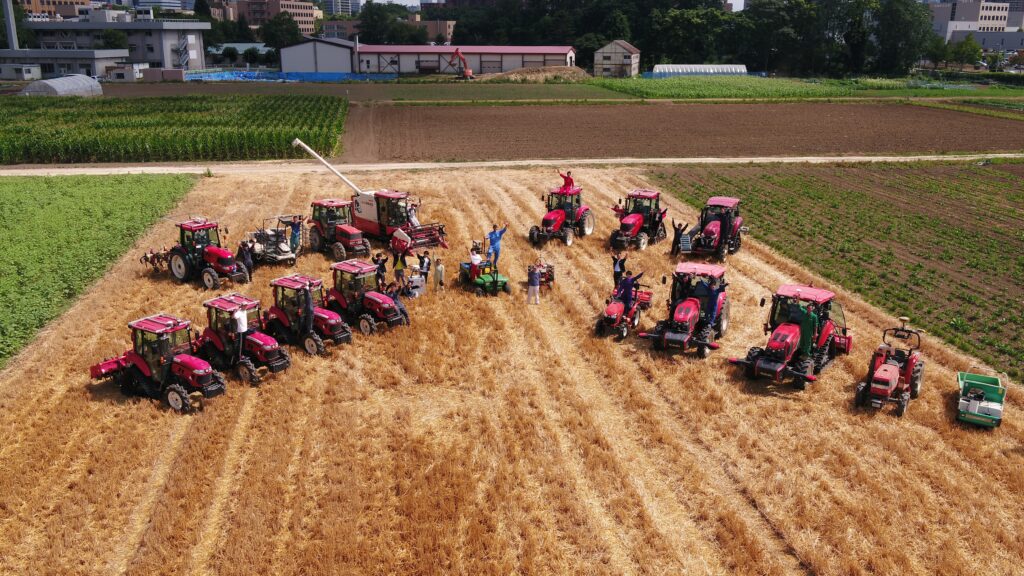This article was published in the Autumn 2022 issue of Litterae Populi. The full issue can be found here.
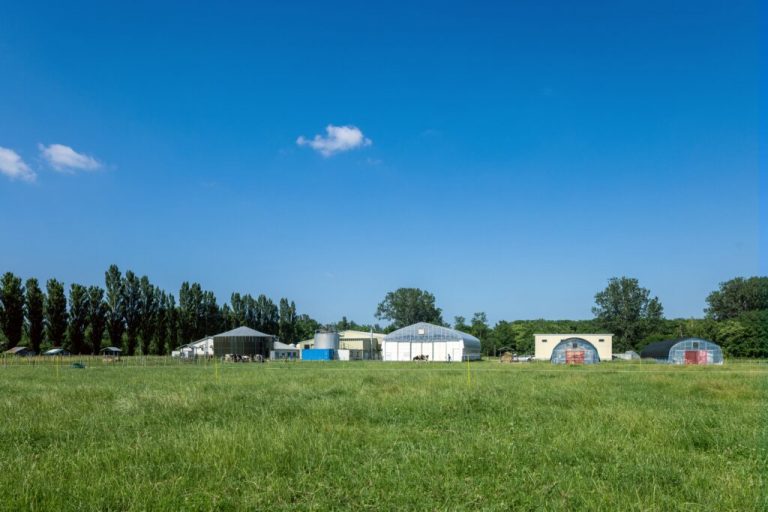
Space and resources on the earth are limited. What is necessary to build a sustainable society on the earth, which is a closed system? Hokudai Robust Center is making great strides in the development of engineering technologies for next-generation agriculture, forestry, and fisheries that will meet practical needs.
In 2018, the Research and Education Center for Robust Agriculture, Forestry and Fisheries Industry was established, mainly centered around the Faculty of Engineering, the Research Faculty of Agriculture, and the Faculty of Fisheries Sciences.
“It takes time to say the center’s official name; therefore, we call it Hokudai Robust Center,” Kazuei Ishii, Director of Hokudai Robust Center, said smilingly.
“I am often asked, ‘What is Robust?’ Simply put, the word portrays an image of resilience, namely, resistance to collapse or falling, even when affected by external influences. We consider that robust means to have the ability to anticipate external influences and prevent self-collapse.”
The external influences surrounding us are immeasurable. While the global environment is drastically changing, the world’s population is growing. How should we achieve stable food production and distribution with limited earthly resources? The word “robust” means to have internal resilience and the ability to withstand changes brought about by external disturbances such as environmental and climate changes.
Based on our most important mission of “Food Valley Concept,” Hokudai Robust Center aims to make the food value chain (the linkage of added value created through a series of activities leading to the provision of products and services to customers) robust by incorporating the concept of production engineering into the agriculture, forestry, and fisheries industries.
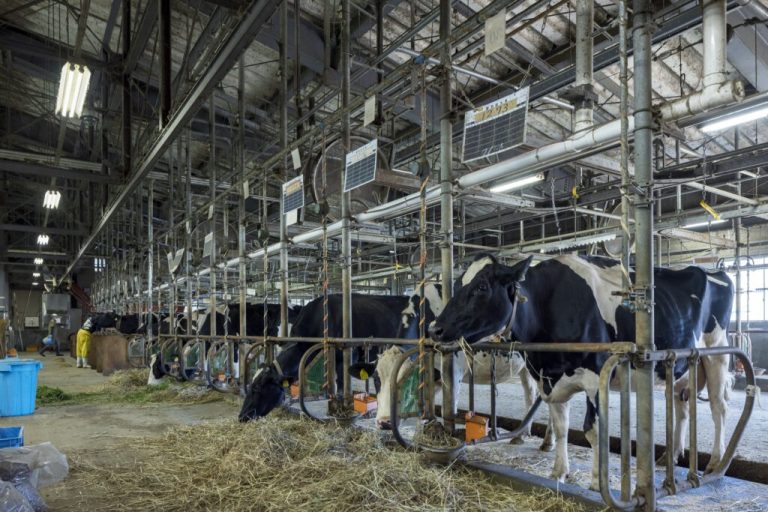
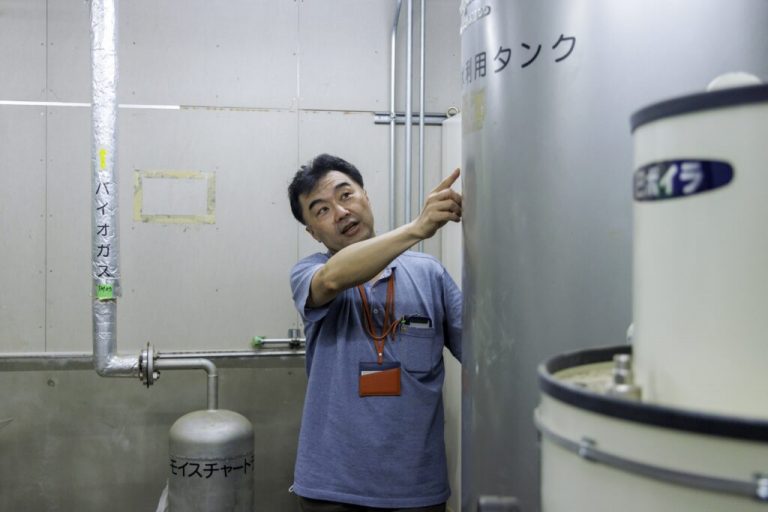
“Industries in Hokkaido are centered on the primary food-related industries. Hokkaido University is also more active in field research than other universities. We take advantage of these opportunities to make the food value chain robust through field research. We try to achieve this goal in line with Society 5.0 (a concept of the future society advocated by Japan, which advocates a human-centered society that achieves economic development and the resolution of social issues through a system that highly integrates virtual and real space) and we apply data-driven approaches. We are also taking the SDGs into account so that our activities will eventually lead to value chains for health, medicine, and pharmaceuticals,” said Director Ishii.
Our role as a platform
Hokudai Robust Center promotes collaborative research by working with various organizations as a platform providing an incubation function. Partners are not limited to organizations within the University; a total of 428 people affiliated with 94 private companies and 39 research institutes or government agencies have been registered as Robust members.
The Secretariat of Hokudai Robust Center plays a coordinating role of matching research seeds and onsite needs. The Secretariat also fosters specialized human resources who can adapt to next-generation agriculture, forestry, and fisheries engineering by obtaining a budget and improving the research environment to promote joint research and provide educational activities related to the joint research. Notably, the Center actively collaborates with overseas organizations.
Unique interdisciplinary research
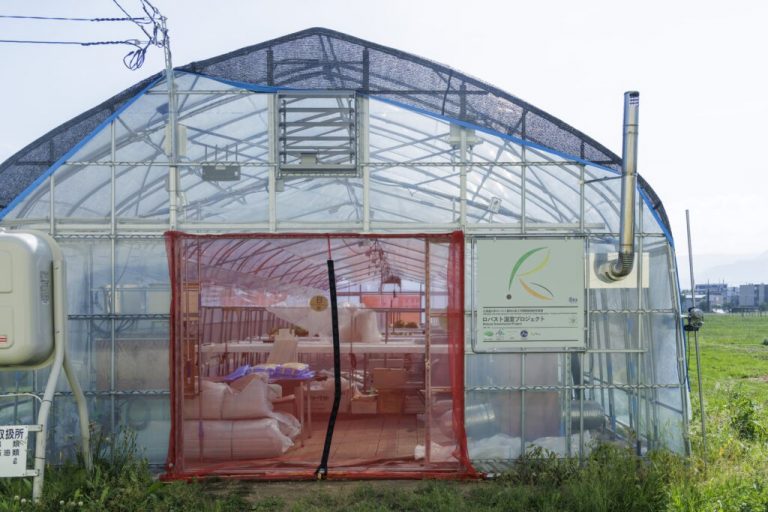
Hokudai Robust Center develops various research activities. One of its representative initiatives is the “Robust Greenhouse Project.” Two greenhouses that have been built on Experiment Farm No.1 on the University’s campus are symbolic experimental spaces for interdisciplinary collaboration between the Research Faculty of Agriculture and the Faculty of Engineering.
The aim of this project is to research heat and light management technology for the typical Hokkaido climate, utilizing heat from biogas plants, and verifying new production methods that match the characteristics of agricultural products in Hokkaido. The Center also develops elemental technologies that help to improve the productivity of facility horticulture.
“This project started with the idea that if agriculture could join forces with engineering, such a project would be feasible,” said Director Ishii. For example, Professor Takashi Suzuki of the Research Faculty of Agriculture knew about the light wavelength conversion film developed by Professor Yasuchika Hasegawa of the Faculty of Engineering. Professor Suzuki then tried to examine the growth of hydroponic vegetables by using this film as greenhouse vinyl. As a result, he found that this method increased the speed at which the vegetables grow speeded up the growth rate of vegetable and increased the number of valuable components they contain. According to Director Ishii, it has the potential to improve earnings by increasing vegetable production in the future and lead to the development of vegetables with added value based on their components and functional properties.
We also provide research grants called Robust Open Recruitment (officially, Robust Agriculture, Forestry and Fisheries Engineering research program), through public offering, and support applications for budding research involving cross-departmental members.
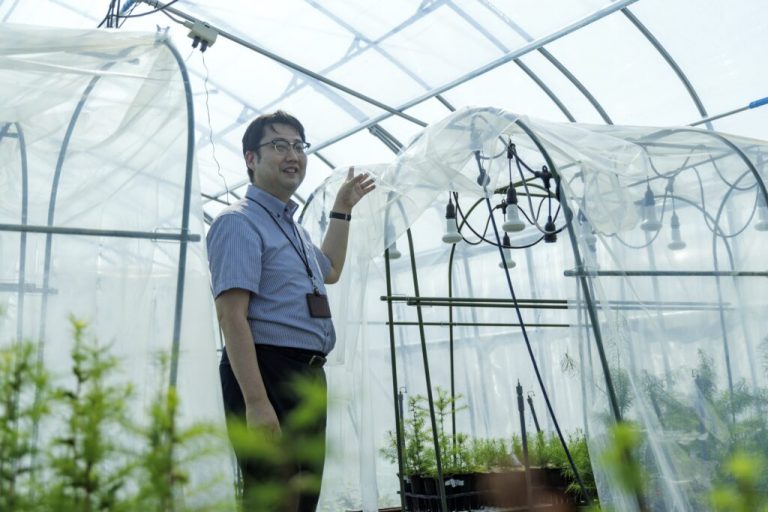
Many of the adopted proposals are unique. One example is a research project that establishes “Aquaponics” as a production platform, a full-fledged collaboration between the Research Faculty of Agriculture and the Faculty of Fisheries Sciences. Worldwide, “aquaponics” is attracting attention as a sustainable agricultural technology that is both productively and environmentally friendly. It is a cyclical aquaculture system in which fish farming and vegetable cultivation take place in the same tank, as vegetables are grown using fish excrement as fertilizer. On the other hand, the vegetables purify the water, thus improving the conditions for the fish to grow.
One of the research projects focuses on the active ingredients of colored beets. Colored beets have a strong antioxidant effect and are said to be effective at warming the human body, especially in cold environments. The research involves the extraction and analysis of active ingredients and to explore their future value for functional food.
“Another research project involves making baseball bats from Hokkaido-grown wood called Dakekamba. It is also interesting that some professors even wonder if it would be possible to popularize the use of Dakekamba by having players of the Nippon Ham Fighters use such baseball bats,” said Director Ishii. Interdisciplinary research, which is unique to a core university is actively performed.
Seven special-interest groups developing various activities
Based on the wide range of fields covered by the Hokudai Robust Center, it has set up the following seven Special-Interest Groups (SIG) to proceed with their different research themes: SIG1: technology for efficiency improvement of production field; SIG2: commodity processing technology; SIG3: technology for long-term preservation of freshness; SIG4: production technology to match production with consumer taste; SIG5: biomass resource utilization and energy utilization technology; SIG6: disaster prevention (robustness of the production fields); and SIG7: international collaboration.
Each SIG separately or in combination has hosted or cohosted symposia and seminars that provide opportunities to showcase their SIG research seeds to other robust members. However, research exchanges were restricted for a while due to the COVID-19 pandemic. Director Ishii mentioned that “Once speakers have presented their research seeds online, it tends to be the end of the story. On the other hand, we emphasize exchanging of ideas and networking by participants after presentations; therefore, opportunities for face-to-face interaction are important.”
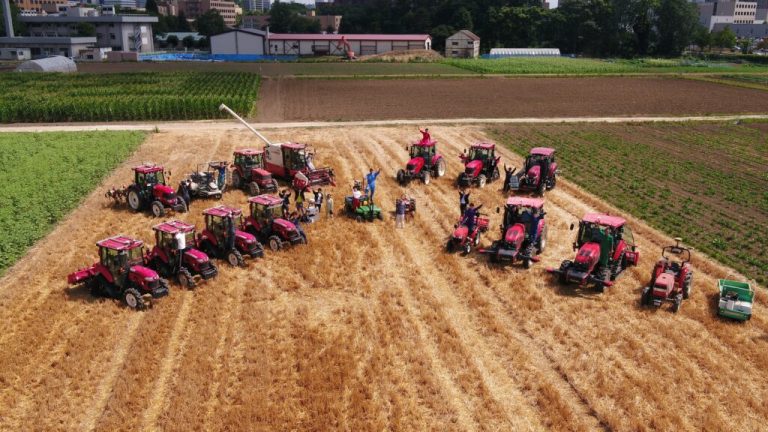
Hokudai Robust Center annually exhibits presentations at the “Agribusiness Creation Fair” organized by the Ministry of Agriculture, Forestry and Fisheries (MAFF). In 2021, the theme was “Dairy Farming × Engineering: New Natural Cheese Development,” in collaboration with Rakuno Gakuen University. Hiroyuki Nakamura, the Vice Minister of MAFF, also visited our booth.
Educational contributions
“The research exchanges have been a great stimulus—not only to us researchers, but also to students,” said Director Ishii. Hokudai Robust Center also plays a vital role in education to foster next-generation specialized human resources.
“We have been offering a course titled ‘Environment and Human Beings: Robust Agriculture, Forestry, and Fisheries Engineering’ for first-year students at our university since last year. The aim of the course is to learn from the actual field for a sustainable society, and faculty members from Hokudai Robust Center serve as instructors in an omnibus format. When we asked students their opinion of the course, we received a good response that they understand the importance of interdisciplinary cooperation and the reality of researchers actually working to solve problems in their field,” he said.
“Universities are divided into different departments, which tend to be vertically divided hierarchies. Hokudai Robust Center may be able to help students understand the original intent of universities by showing them the actual interdisciplinary fields. Classroom lectures serve a good purpose, but I would like to introduce the various issues they face and let them discuss possible approaches to tackle the situation,” said Director Ishii enthusiastically.
Aiming to solve local issues with an eye on the world
In June 2021, “Hokkaido Prime Bio-Community” was certified as a regional bio-community by the Cabinet Office. As the core institution in this community, Hokkaido University, with its strength in field research, is working with local governments and industry to make “Hokkaido; a longed-for place where everyone wants to be engaged in the agriculture, forestry, and fisheries industry.” Hokudai Robust Center is expected to contribute to the fields of carbon-neutrality and of smart agriculture, engineering, and fisheries. The center is also promoting the “center for forming a carbon-neutral food production community using local energy” project under the “support program of the platform for industry-academia co-creation (COINEXT)” by the Ministry of Education, Culture, Sports, Science and Japan Science and Technology Agency adopted in October 2021.

Hokkaido University was ranked 10th in the world and 1st in Japan in the overall THE Impact Rankings 2022 (rankings by the British higher education magazine Times Higher Education visualizing the social contribution efforts of universities using the framework of the United Nations Sustainable Development Goals (SDGs)). In addition, concerning the 17 SDGs targets, Hokkaido University ranked 1st in the world for SDGs Goal 2, “Zero Hunger.” These marks are truly the result of the efforts of our predecessors, who have promoted field research on agriculture, forestry, fisheries, and other related fields by leveraging the strength of Hokkaido’s rich natural background. Hokudai Robust Center was formed by inheriting this will. Looking ahead to the world from Hokkaido, initiatives are underway to resolve issues to achieve the SDGs.
This article was published in the Autumn 2022 issue of Litterae Populi. The full issue can be found here.


